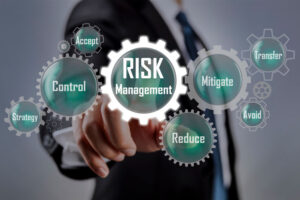Risk management is the process of predicting and assessing risks and developing a strategy for avoiding or mitigating the impact they have on the organization. Risk management is crucial to businesses because without it, a company can’t thrive.
We all accept that in life, things will inevitably go wrong — despite our wishes to the contrary. This knowledge is why people enroll in health insurance plans and put money away for a rainy day. We hope for the best and plan for the worst.
The same is true for businesses.
Something will inevitably go wrong. A pandemic will seize the world. A wildfire, earthquake, or hurricane will ravage land and devastate communities. An economic downturn will send investors into a frenzy. It’s the nature of life, and it’s the nature of business.
Savvy organizations see the importance of risk management as clearly as we see the importance of buying life insurance.
Risk management is necessary for every aspect of a company’s operation, including:
- Accounting
- Information Technology
- Human Resources
- Management
Top Business Risks
 All companies, whether large corporations or small businesses, must have a plan in place to address risks associated with economic instability, technology and liability issues, natural disasters, and cyber incidents.
All companies, whether large corporations or small businesses, must have a plan in place to address risks associated with economic instability, technology and liability issues, natural disasters, and cyber incidents.
In a survey of 2,650 risk management experts in 89 countries, 44 percent of respondents identified cybercrime as the most significant risk to businesses in 2022.
According to international marketing and consumer data company Statista, respondents also cited the following risks:
- Business interruption – 42%
- Natural catastrophes – 25%
- Pandemic outbreak – 22%
- Policy and regulation changes – 19%
- Climate change – 17%
- Fire, explosion – 17%
- Market development – 15%
With so many potential threats to the financial stability of a company, a solid risk management plan should be a top priority for every corporation and business owner.
Benefits of a Successful Risk Management Strategy
Risk management is a term that is frequently bandied about on the upper rungs of the corporate ladder, but many people don’t understand how important it is to everyone on the payroll.
Risk management software solution ClearRisk emphasizes the advantages — including some of the lesser known — of risk management, such as:
- Safer workplaces
- Project success
- Greater efficiency
- Improved communication
- Reputational protection
- Positive culture
- Decision-making guidance
It goes without saying that a profitable and healthy company means job security, pay raises, and promotions. A company with no strategy for responding to risk is a volatile and precarious place to work. Thus, employees would be wise to support risk management systems across all departments.
Types of Risk
Several types of risk plague businesses and investors. It’s important for risk management plans to be relevant to the types of risk they are intended to respond to. In the broadest terms, there are unsystematic risks and systematic risks.
Unsystematic Risk
Unsystematic risk is unique to a company or industry and can be avoided to some extent. Unsystematic risk is also referred to as “specific risk” or “diversifiable risk.”
According to Investopedia, the five types of unsystematic risk include:
- Business risk
- Financial risk
- Operational risk
- Strategic risk
- Legal and regulatory risk
Unsystematic investment risk can be mitigated by portfolio diversification.
Systematic Risk
Systematic risk is tied to broad market factors and affects all companies in an industry. It is external and cannot be avoided. People may also refer to systematic risk as “market risk” or “non-diversifiable risk.”
Types of systematic risk include:
- Interest rate risk
- Market risk
- Inflation
- Geopolitical risk
- Natural disasters
Risk can also be categorized in terms of financial versus business.
Financial Risk
Financial risk applies to companies, governments, and the market. It involves an entity’s management of debt and capital.
Common types of financial risk include:
- Credit risk
- Liquidity risk
- Equity risk
- Currency risk
Financial risk management is one of the fastest growing occupations, with a projected growth rate of 17 percent from 2020 to 2030 as compared with an 8 percent growth rate for all occupations in the U.S. economy during that time.
Business Risk
Risk associated with a company’s profitability and solvency is referred to as business risk. Business risk requires a risk management plan that accounts for the various factors that may negatively affect the company’s bottom line.
These risks include:
- Strategic risk
- Operational risk
- Reputational risk
- Compliance risk
Companies can reduce or prevent business risk by providing employees with proper training, administering background checks, being diligent about safety protocols, maintaining the premises and all equipment. A skillful risk manager can oversee a carefully developed risk management system to ensure that prevention strategies are followed.
Risk Management: Structure, Process & Response
Risk management is a complex problem-solving approach to optimizing business operations. An effective plan requires quantitative and qualitative skills, with the former implemented for data collection and analysis and the latter for developing risk-response strategies based on insights from the data.
A holistic risk management approach will address:
- Risk identification and assessment
- Risk response
- Monitoring and reviewing the risk management plan
Simply identifying risks won’t allow a business to grow and succeed. The organization must assess the risks and determine their causes. From there it must decide whether its response will be prevention, mitigation, or acceptance and develop its plan accordingly.
Whether internal, external, technical, or legal, all operational and financial risks must be faced with pragmatism and consistency. Risk managers and analysts should review the system regularly to ensure that it is still relevant and effective in the evolving landscape of business and finance.
Is Risk Management a Good Career?
 Risk management professionals enjoy rewarding, lucrative careers in a variety of fields. From business intelligence analysts and data analysts to operational and financial risk managers, these professionals can expect a strong job outlook and high levels of job satisfaction.
Risk management professionals enjoy rewarding, lucrative careers in a variety of fields. From business intelligence analysts and data analysts to operational and financial risk managers, these professionals can expect a strong job outlook and high levels of job satisfaction.
Annual salaries for risk management professionals are significantly higher than the average salary in the United States. This is especially true for financial risk managers, who earned between $77,040 and $208,000 in May 2021.
Financial Risk Managers
According to data from Recruiter.com, financial risk specialists earn the highest salaries in the following industries:
- Finance and Insurance – $94,950
- Information – $91,320
- Mining, Quarrying, and Oil and Gas Extraction – $91,270
- Utilities – $87,570
- Management of Companies and Enterprises – $86,510
- Manufacturing – $83,950
New York and Maine boast the highest salaries for financial risk managers, according to Recruiter.com.
Risk Analysts
A career path in risk management generally begins with an entry-level position as a risk analyst and progresses to the more experienced and highly trained risk manager role.
Risk analysts handle the technical aspects of risk management. People suited to this role have an aptitude for interpreting data and quantifying the negative effects of risk. They must also possess superior mathematical and statistical skills.
Common risk analyst jobs include:
- Financial risk analyst
- Credit risk analyst
- Insurance risk analyst (Underwriter)
- Market risk analyst
- Management analyst
- Budget analyst
According to the U.S. Bureau of Labor Statistics, median annual wages for these occupations ranged from $63,920 to $93,000, and employment is predicted to increase by 8 percent from 2020 to 2030.
How To Become a Risk Management Professional
 Educational opportunities for people who are interested in a career in risk management include certifications, bachelor’s degrees, and master’s degrees from public and private institutions.
Educational opportunities for people who are interested in a career in risk management include certifications, bachelor’s degrees, and master’s degrees from public and private institutions.
The ability to assess and control existing threats to organizations is a skill set that requires knowledge of machine learning, artificial intelligence, business analytics, data science, finance, statistical methods, and mathematics — among other relevant disciplines.
Depending on the role and area of risk management one hopes to attain, financial risk management certification and on-campus and online risk management degree programs are suitable for all levels and specializations of risk management professionals.
Courses and Training
Aspiring risk managers can benefit from a bachelor’s or master’s degree in business administration, finance, economics, or a related degree program with an emphasis on:
- Decision-making
- Communication
- Leadership skills
- Organizational skills
- Analytical skills
Job seekers who are interested in the technical aspects of risk management, such as data analysis, database management and reporting, and SQL, should consider degree programs in:
- Risk management analysis
- Business analytics
- Data analytics
- Mathematics
- Statistics
- Computer science
Summary
Risk management is essential to the success of any business or financial venture despite its size, industry, or, in the case of investment risk, beta (measure of a security’s volatility).
In the wake of the economically crippling COVID-19 pandemic and amidst the adverse effects of the war in Ukraine on global markets, it has become exceedingly clear that businesses must protect themselves against uncertainty if they want to prosper. The threats continue to multiply and permeate every facet of finance and business, demanding proactive, clearly defined risk management solutions.





